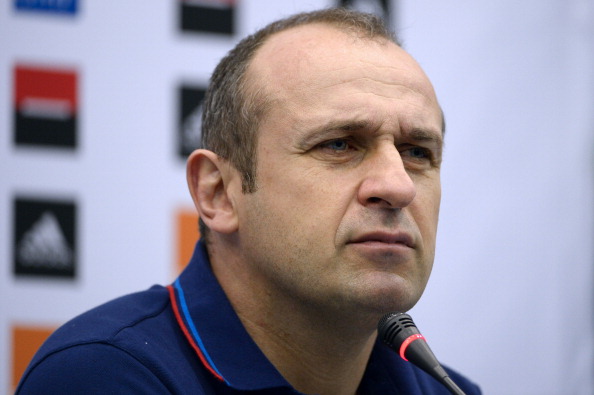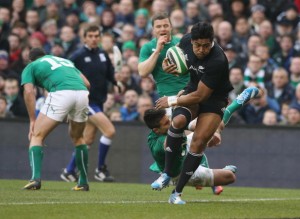
Cut loose: Would we see more adventure in the pursuit of tries if there were bonus points available in the Six Nations?
By Charlie Morgan
Sell-out crowds drummed up into a patriotic frenzy, fascinating sub-plots featuring players and coaches, Eddie Butler’s dulcet tones set against a back-drop of Kasabian – the Six Nations has many attributes.
On these shores, Boxing Day is normally the cue for anticipation to start building. By the time a BBC montage is sent out across the airwaves a month later, excitement and expectation have reached dizzying levels. But – and we don’t often dare admit this about something so precious – blood and thunder always eclipse skill level. Physicality and endeavour are never lacking. Cutting edge is tougher to find.
After two rounds this year, there is a familiar story. In Ireland, the side most efficiently combining accuracy and aggression is occupying top spot. Characteristically sporadic French brilliance has fashioned a pair of wins. Many have found encouragement from England’s new-found ambition. In a tournament that is meant to offer a significant signpost to the 2015 World Cup though, not much else has been worth writing home about.
Granted, difficult conditions and downright appalling surfaces don’t help the prospect of free-flowing, inventive attack. Still, aimless and predictable spells are lingering like a Murrayfield nematode. Having reinforced their collective superiority in autumn, the southern hemisphere giants will not be overly intimidated.
Perhaps the most valuable trait of this competition is tradition. When history adds a dash of feeling, rivalries become more special. However, it shouldn’t obstruct evolution. Debate over introducing a bonus-point system to the Six Nations has raged for years. Next season is a perfect time to take the plunge.
Let’s start with a striking statistic. In 2013, we saw just 37 tries – the lowest since the game went professional in 1995. A meagre tally of 2.5 scores a game maintained a steady 14-year decline from the inaugural Six Nations when 75 five-pointers were recorded. It would be naïve to attribute this solely to Italy’s development and a consequent rise in competitiveness. Teams are simply not penetrative enough.
Despite some marked mismatches, nobody this year has yet managed to cross four times in one game. Without any incentive to limit a defeat to seven points or less either, a couple of encounters have petered out as well.
Take the current Championship’s opening encounter in Cardiff – Wales’ 23-15 win over Italy. Would the hosts have been less lax with the carrot of a five-point return? Should the Azurri have been rewarded if they had managed to get within a score? Both of those questions are perhaps presumptuous and certainly theoretical, but because Six Nations culture rewards drab victories and ignores close losses, everyone left the Millennium Stadium feeling slightly deflated.
Nobody will make an impression in 2015 without well-oiled structures and spark with ball in hand. Coaches as bright as Joe Schmidt, Warren Gatland and Stuart Lancaster do not need a revamped structure to know that. This isn’t just about reducing the risk of fans getting disillusioned by dull finishes, either.
The crux is this: northern hemisphere nations are not working on the same scoring basis as the World Cup. Each player is used to bonus-point demands from Heineken Cup, Aviva Premiership, Top 14 and Pro12 action, but strangely surrender such a mentality during the Six Nations, a pivotal time to work towards their all-consuming endgame.
Intriguingly, England would be reigning champions if last season’s results had played out under bonus-point conditions. Their 38-18 thrashing of Scotland – punctuated by scores from Chris Ashton, Billy Twelvetrees, Geoff Parling and Danny Care – would have sent them into the finale in Cardiff with a five-point cushion.
Given Wales’ overwhelming supremacy that night, the thought of Chris Robshaw collecting the Six Nations trophy following a 30-3 hiding is grimly laughable. As it was, points difference produced worthy Six Nations winners – it’s impossible to argue that Sam Warburton’s men didn’t deserve it.
Why not ponder, though? With hindsight, a four-try haul for Wales that evening is entirely plausible had tournament rules required it. Each of the seven three-pointers they converted – five penalties from Leigh Halfpenny, one plus a drop-goal from Dan Biggar – were in positions from which they could have threatened England’s line. The immense atmosphere would have sucked at least one driving maul over for the men in red.
Besides anything else, the scenario would have been invaluable practice for Wales’ task in 2015. In Pool A alongside England and Australia, their fate will be decided by bonus points if the big three win and lose one each over a deliciously tense round-robin at Twickenham. Victory will always be the priority of course, but staying within seven or capitalising on periods of ascendancy with tries might prove to be the difference.
Voiced most audibly by France coach Philippe Saint-Andre, the main argument in opposition of the modern system is that it would mess with the mystique of a Grand Slam. Although unlikely, a side may register five wins but be usurped by another whose particularly potent attack has carved out four heavy triumphs and a narrow reverse. Saint-Andre makes a valid point. There’s a way around it.
As woven into the rich tapestry of home nations rugby, a Slam is the Holy Grail and it is ridiculous to think it would not be enough to take the Championship. How about an additional ten points being awarded for a clean sweep just to force the issue, then? Other idiosyncrasies can be saved as well. Triple Crowns can survive amid bonus-points and the scrap to avoid the wooden spoon would be more absorbing and meritocratic.
Australia, New Zealand and South Africa are still ahead and proactivity is needed to close the gap. When World Cup performances hold so much sway in terms of national pride, player selection and coaching structures, it is utter madness not to hold the key competition for European teams under the same rules. The Six Nations isn’t broken, but that doesn’t mean it can’t be fixed. Trading a redundant slither of romanticism for a ticket out of mediocrity seems a decent deal.









